
A hulk is a ship that is afloat, but incapable of going to sea. Hulk may be used to describe a ship that has been launched but not completed, an abandoned wreck or shell, or to refer to a ship whose propulsion system is no longer maintained or has been removed altogether. The word hulk also may be used as a verb: a ship is "hulked" to convert it to a hulk. The verb was also applied to crews of Royal Navy ships in dock, who were sent to the receiving ship for accommodation, or "hulked". Hulks have a variety of uses such as housing, prisons, salvage pontoons, gambling sites, naval training, or cargo storage.

The Royal Naval Reserve (RNR) is one of the two volunteer reserve forces of the Royal Navy in the United Kingdom. Together with the Royal Marines Reserve, they form the Maritime Reserve. The present RNR was formed by merging the original Royal Naval Reserve, created in 1859, and the Royal Naval Volunteer Reserve (RNVR), created in 1903. The Royal Naval Reserve has seen action in World War I, World War II, the Iraq War and the War in Afghanistan.

Impressment, colloquially "the press" or the "press gang", is the forced conscription of men into a military force, especially a naval force, via intimidation and physical coercion, conducted by an organized group. European navies of several nations used forced recruitment by various means. The large size of the British Royal Navy in the Age of Sail meant impressment was most commonly associated with Great Britain and Ireland. It was used by the Royal Navy in wartime, beginning in 1664 and during the 18th and early 19th centuries as a means of crewing warships, although legal sanction for the practice can be traced back to the time of Edward I of England. The Royal Navy impressed many merchant sailors, as well as some sailors from other, mostly European, nations. People liable to impressment were "eligible men of seafaring habits between the ages of 18 and 55 years". Non-seamen were sometimes impressed as well, though rarely. In addition to the Royal Navy's use of impressment, the British Army also experimented with impressment from 1778 to 1780.

The Spithead and Nore mutinies were two major mutinies by sailors of the Royal Navy in 1797. They were the first in an increasing series of outbreaks of maritime radicalism in the Atlantic World. Despite their temporal proximity, the mutinies differed in character. The Spithead mutiny was a simple, peaceful, successful strike action to address economic grievances, while the Nore mutiny was a more radical action, articulating political ideals as well, which failed.
The Royal Naval Reserve are a part of the Royal Navy of the United Kingdom.
Prize money refers in particular to naval prize money, usually arising in naval warfare, but also in other circumstances. It was a monetary reward paid in accordance with the prize law of a belligerent state to the crew of a ship belonging to the state, either a warship of its navy or a privateer vessel commissioned by the state. Prize money was most frequently awarded for the capture of enemy ships or of cargoes belonging to an enemy in time of war, either arrested in port at the outbreak of war or captured during the war in international waters or other waters not the territorial waters of a neutral state. Goods carried in neutral ships that are classed as contraband, being shipped to enemy-controlled territory and liable to be useful to it for making war, were also liable to be taken as prizes, but non-contraband goods belonging to neutrals were not. Claims for the award of prize money were usually heard in a prize court, which had to adjudicate the claim and condemn the prize before any distribution of cash or goods could be made to the captors.

The history of the Royal Navy reached an important juncture in 1707, when the Act of Union merged the kingdoms of England and Scotland into the Kingdom of Great Britain, following a century of personal union between the two countries. This had the effect of merging the Royal Scots Navy into the Royal Navy. The Navy grew considerably during the global struggle with France that had started in 1690 and culminated in the Napoleonic Wars, a time when the practice of fighting under sail was developed to its highest point. The ensuing century of general peace saw Britain virtually uncontested on the seas, and considerable technological development. Sail yielded to steam and cannon supplanted by large shell-firing guns, and ending with the race to construct bigger and better battleships. That race, however, was ultimately a dead end, as aircraft carriers and submarines came to the fore and, after the successes of World War II, the Royal Navy yielded its formerly preeminent place to the United States Navy. The Royal Navy has remained one of the world's most capable navies and currently operates a fleet of modern ships, though the size of the fleet has declined significantly since the 1980s.
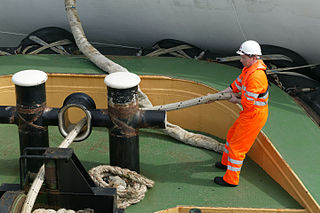
The Mission to Seafarers is a Christian welfare charity serving merchant crews around the world. It operates through a global Mission 'family' network of chaplains, staff and volunteers and provides practical, emotional and spiritual support through ship visits, drop-in seafarers centres and a range of welfare and emergency support services.
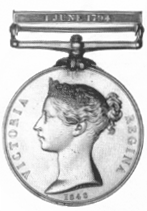
The Naval General Service Medal (NGSM) was a campaign medal approved in 1847, and issued to officers and men of the Royal Navy in 1849. The final date for submitting claims was 1 May 1851. Admiral Thomas Bladen Capel was one of the members of the board that authorised the medal.
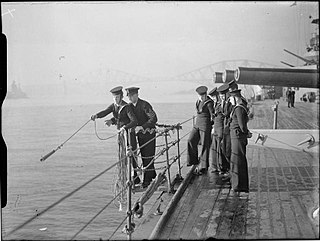
A boy seaman is a boy who serves as seaman or is trained for such service.

The allotment system was a system used in Sweden for keeping a trained army at all times. This system came into use in around 1640, and was replaced by the modern Swedish Armed Forces conscription system in 1901. Two different allotment systems have been in use in Sweden; they are the old allotment system and the new allotment system, the latter often referred to as just "the allotment system". The soldiers who were part of these systems were known as "croft soldiers" due to the small crofts allotted to them.

The King's shilling, sometimes called the Queen's shilling when the Sovereign is female, is a historical slang term referring to the earnest payment of one shilling given to recruits to the armed forces of the United Kingdom in the 18th, 19th and 20th centuries, although the practice dates back to the end of the English Civil War. To "take the King's shilling" was to agree to serve as a sailor or soldier in the Royal Navy or the British Army. It is closely related to the act of impressment. The practice officially stopped in 1879, although the term is still used informally and there are some cases of it being used still in the early 20th century, albeit largely symbolically.
The maritime history of the United States is a broad theme within the history of the United States. As an academic subject, it crosses the boundaries of standard disciplines, focusing on understanding the United States' relationship with the oceans, seas, and major waterways of the globe. The focus is on merchant shipping, and the financing and manning of the ships. A merchant marine owned at home is not essential to an extensive foreign commerce. In fact, it may be cheaper to hire other nations to handle the carrying trade than to participate in it directly. On the other hand, there are certain advantages, particularly during time of war, which may warrant an aggressive government encouragement to the maintenance of a merchant marine.
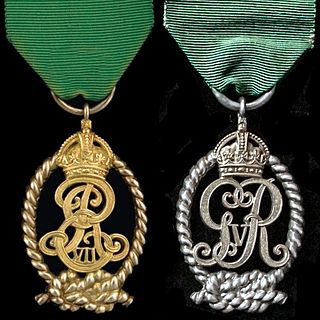
The Decoration for Officers of the Royal Naval Volunteer Reserve, post-nominal letters VD until c. 1947 and VRD thereafter, was instituted in 1908. It could be awarded to part-time commissioned officers in the United Kingdom's Royal Naval Volunteer Reserve after twenty years of service as efficient and thoroughly capable officers. The decoration was a Naval version of the Volunteer Officers' Decoration and its successor, the Territorial Decoration.
The United States merchant marine forces matured during the maritime history of the United States (1900–1999).

Royal Navy ranks, rates, and uniforms of the 18th and 19th centuries were the original effort of the Royal Navy to create standardized rank and insignia system for use both at shore and at sea.

George St Lo was a British naval officer and politician.

The Naval Long Service and Good Conduct Medal (1830) of the United Kingdom was introduced in 1830 and ratified by King William IV in 1831. It could only be awarded to selected Navy ratings after altogether 21 years of service and good conduct. The medal remained in use until 1847, when it was replaced by the Naval Long Service and Good Conduct Medal (1848).
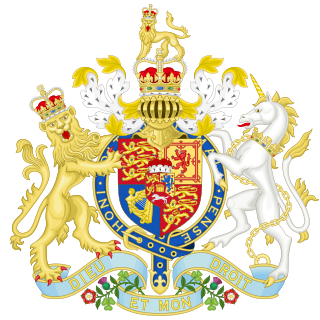
The Militia Act 1802 was an Act of Parliament of the United Kingdom affecting the Militia, a locally raised force for home defence. It applied to England and Wales, with Scotland covered by the Militia (Scotland) Act 1802, and Ireland by the Militia (Ireland) Act 1802. Subsidiary acts dealt with the City of London, the Cinque Ports, and the Stannaries, which had special legal requirements.

The Royal Naval Coast Volunteers (RNCV) was a 19th century reserve force of the British Royal Navy. The volunteers were established in 1853 and the force lasted until 1873 when it was disbanded, with some of its volunteers entering the Royal Naval Reserve.














